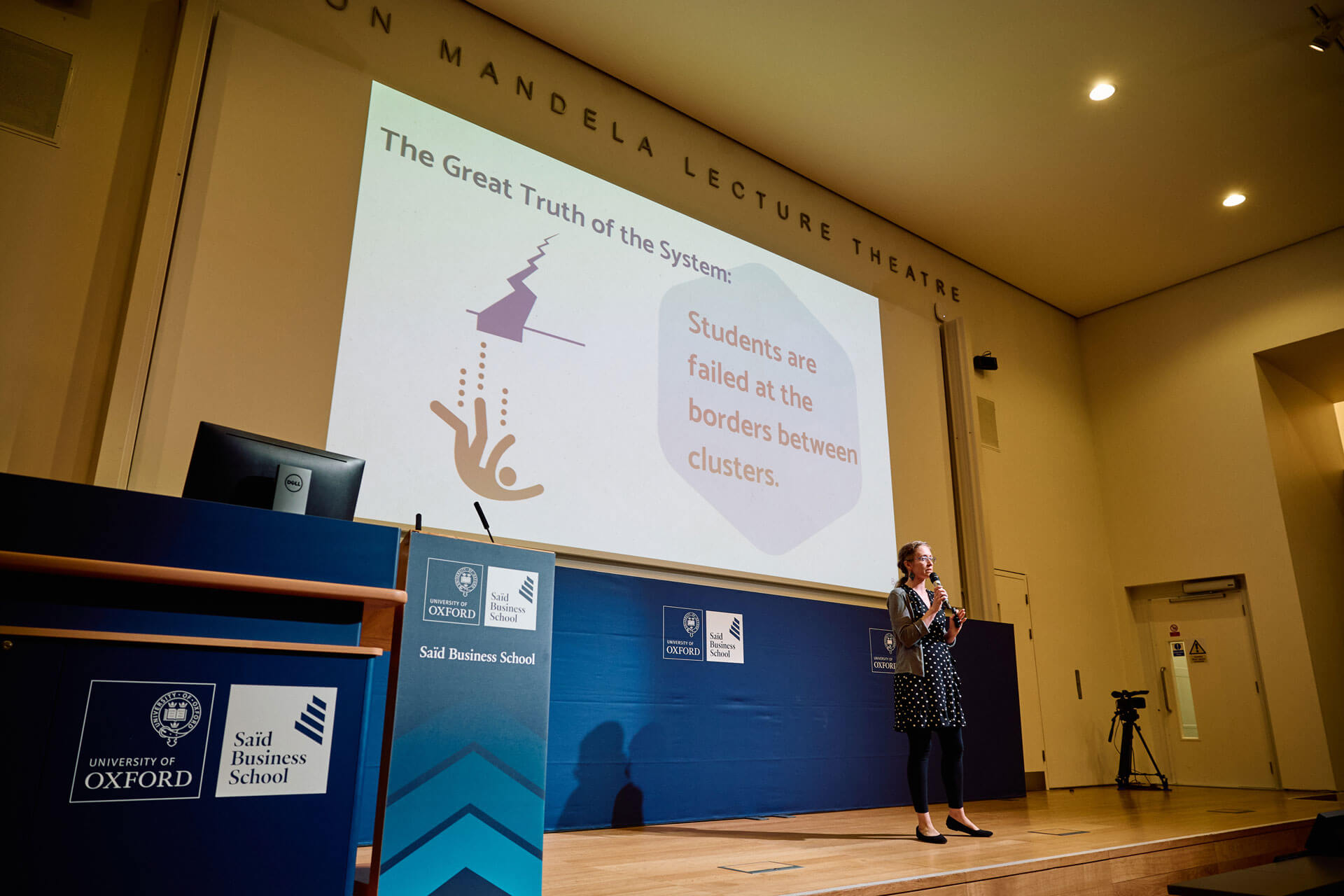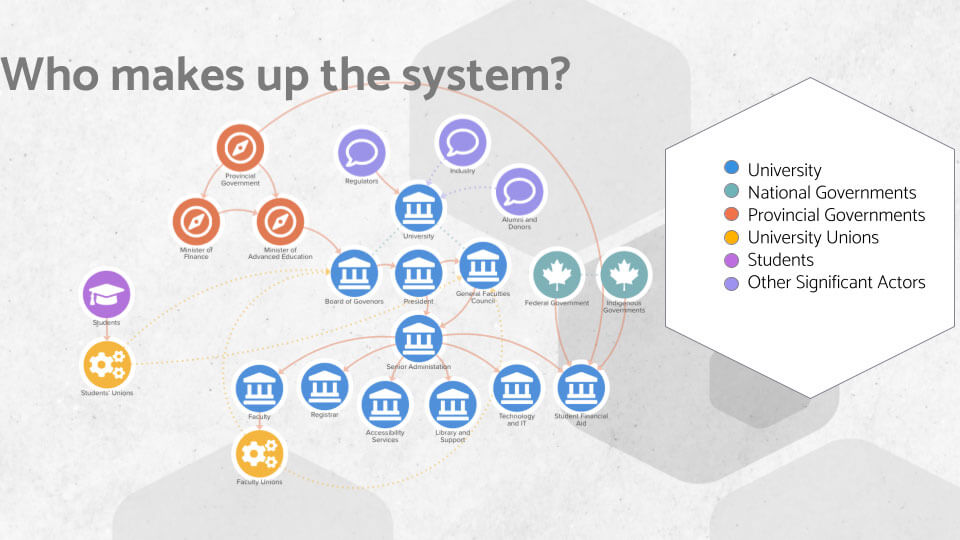AU student among world’s best at Map the System finals
Athabasca University student Karen Fletcher among top 6 at global competition held at Oxford University
Athabasca University (AU) student Karen Fletcher wants a post-secondary education system where all students have access to the resources they need to succeed. That means academic supports, but also access to basic human rights such as a safe place to live and having food on the table.
Fletcher outlined her vision for change at the global Map the System finals held July 9 at Oxford University. She was 1 of 6 finalists at the international competition, which asks students to use a systems-based approach to solving a pressing social or environmental challenge.
“I’ve had students tell me that they don’t know how they’re going to make the exam because they don’t have childcare,” Fletcher explained as she opened her 10-minute presentation.
“And I’ve had students tell me that they had to put food back at the grocery store because they can’t afford that anymore. And I’ve had students tell me they have to drop out.”
Working to change the post-secondary system
Fletcher’s commitment for student well-being came through in her presentation, Leaks in the System, which outlined barriers to student success in the post-secondary system.
The topic has become a passion for the Bachelor of Science – Applied Mathematics Major student. She spent 2 years listening to student concerns and working for change as an executive with the Athabasca University Students’ Association (AUSU), including a year as president.
“I just deeply care about people,” Fletcher explained in an interview. “In whatever situation I’m in, I want everyone to be treated well. And we have to find a functional way to do that.”
Road to Map the System
In a way, Fletcher’s roles with AUSU gave her 2 years of experience that helped prepare her for competing against the world’s best at Map the System.
As an AUSU executive, she worked with students, AU administration, student advocacy groups, and governments at the provincial and federal level to ensure students are supported—and heard—while pursuing higher education.
“It was my job to listen to students and bring their concerns and advocate for them.”
In fact, she first learned about Map the System through her AUSU advocacy on a visit to Parliament last year. She was among dozens of student leaders from across Canada who were advocating for change in meetings with federal representatives.
“A friend of mine looked at me and said there’s this thing called Map the System, and you would love it,” she said.
International competition
Map the System was created in 2015 by the Skoll Centre for Social Entrepreneurship at Oxford and has since grown into an international competition with 900 teams participating in 2023. This was the first time that AU held a competition, organized by the Faculty of Humanities and Social Sciences.
Fletcher decided to compete at AU, and hasn’t looked back since. Not only did she win that first competition, she went on to represent the university at the Canadian finals in June when she earned 1 of 17 spots in the global competition.
Dean Dr. Manijeh Mannani applauded Fletcher’s performance at each level of the competition.
“Karen’s progressive vision to transform the post-secondary system into one in which there is space and opportunity for all students speaks to a much-needed overhaul in the educational ecosystem,” she said.
“Fortunately, at AU and in the Faculty of Humanities and Social Sciences, we have faculty and staff committed to equitable education and a sustainable future for those studying with us today and in the decades to come.”

Landing in the top 6
At Oxford, she was among the 6 finalists competing to the end—the only single-person team to do so. Being a team of 1 might seem like a disadvantage, but Fletcher said it also kept things simple. She could work on her presentation on her own schedule—a level of flexibility that’s important for the mother of 3 young children.
In addition to relying on her years of experience as an AUSU executive, Fletcher prepared by meeting with several AU executives with international experience in student systems, including Dr. Matt Prineas, provost and vice-president academic, and former deputy provost Dr. Anne-Marie Scott. She connected with university leaders as far away as Australia.
“I absolutely did not believe that I would end up going to Oxford … but it was really, really exciting and great to meet people from all over the world.”
Overcoming silos and hierarchies
In her presentation, Fletcher describes the complexity of the post-secondary system in Canada, which is often siloed and hierarchical. When the system fails students, it’s not because individuals don’t care, she said, but because different areas don’t work together well.
Students might get support from financial aid or an accessibility services office, but those supports often don’t work seamlessly together.
“As students straddle those 2 systems, they end up being failed by the system.”

Change can be incremental
Making systems-wide change to such a complex sector can seem daunting. Fletcher said it’s important to start by considering why certain decisions are made in the first place.
For example, as part of her AUSU advocacy, she approached the provincial government about changing rules that prevented students visiting AU from receiving provincial student loans.
Initially she was told the government only funds students’ pursuit of a credential, not open studies. After some back and forth, government understood that visiting students are in fact working towards their credential and agreed to change the rules.
“If you understand the reason for the rule, you can start to talk about how we can make your goals and my goals work together,” Fletcher said.
Working on solutions
Thanks to her impressive showing at Map the System, Fletcher will get to further her research. Canadian teams competing at Oxford receive $10,000 grants to focus on a problem and solution.
In her case, she’s going to spend the next 8 months focusing on student financial aid to ensure students are treated equitably. For example, a student with children can be eligible for more student funding than a student of similar means caring for a sibling or older relative just because of how dependents are defined.
“They make the same amount of money, they should get the same amount of student loans,” she said.
Fletcher said her roles at AUSU added about an extra 2 years to her original timeline for completing her bachelor’s degree. Pursuing this research will further extend that delay, but she said it’s time well spent.
“I know that I have a really awesome opportunity to make real change and I’m willing to spend the extra time if that’s what it takes.”
Watch the Map the System finals
Fletcher’s presentation starts at about 3:56:50.